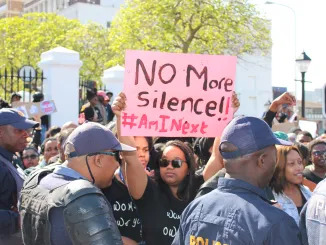Dilapidated infrastructure, water shortages, network problems and lack of electricity have been cited as some of the causes for the failure of South Africa’s criminal justice system in dealing with cases of gender-based violence.
Civil society organisations fighting for victims of gender-based violence (GBV), say it is tragic that it took the loss of two lives, according to a report by News24, for the Office of the Public Protector to investigate the appalling treatment of victims of GBV by the departments of justice and constitutional development, and social development, and by SAPS.
On Tuesday, the public protector, Kholeka Gcaleka, released a damning report on services provided by state organs to victims of GBV. The public protector investigated allegations that the conduct of court officials was improper, constituted maladministration and prejudiced Altecia Kortje and her family. She was turned away at the Bellville Magistrate’s Court in June 2020 when she tried to apply for a protection order against her partner and eventual killer.
“It is established through the Public Protector’s investigation that Ms Kortje left the Bellville Magistrates Court about an hour after her arrival without completing and submitting the application form for further assistance. Her explanation to Ms Dolf, who had been accompanying her to court on the day, was that she did not expect that it would be a long process to obtain the Protection Order and there was too much to write,” reads a statement from the Office of the Public Protector.
The public protector’s investigation into the administrative challenges faced by GBV victims in the criminal justice system was also called for by the Deputy Minister of Justice John Jeffery in June 2020. On this count, the report reveals that the Department of Justice and Constitutional Development did not put adequate measures in place to protect victims of GBV.
Speaking to Elitsha in reaction to the report, executive director of anti-GBV organisation Mosaic, Tarisai Mchuchu-Macmillan said, “We are concerned that the findings might fall on deaf ears as they are not new. Several reports have highlighted the systemic, administrative challenges before, yet there have not been significant changes to the administration of justice, care and support that is focused on changing experiences of GBV survivors within the system.” As an organisation that contributed to providing comment to the Office of the Public Protector, Mosaic applaud them for issuing a report that is clear, with direct and practical solutions: “The success of this report [will be] decisive action by each named department, within the set time frames”.
Advocacy specialist at Rape Crisis, Jeanne Bodenstein said, “The effects of maladministration by various government departments are that survivors are not receiving access to the services that they need in the aftermath of incidents of GBV. Survivors of sexual violence should have access to medical care, a forensic examination, psychosocial support, referrals for ongoing support, and the opportunity to report the matter to the police.
“This requires government departments to be resourced to do this work and to work together. The report shows that this is often not the case. The report sets out remedial actions that have to be taken by the departments of justice and social development, and the South African Police Service. The above mentioned departments must ensure that these actions are taken and the public protector must monitor this,” she told Elitsha.
Dilapidated infrastructure, water shortages, network problems and lack of electricity have been cited as some of the causes for the failure of South Africa’s criminal justice system in dealing with cases of gender-based violence. The report notes that “there was inadequate office equipment such as malfunctioning telephone lines, switchboards and air conditioners, persistent network problems, broken photocopiers, shared computers, for example at Magistrates Courts in Umlazi, Umbumbulu, Mamelodi, Pretoria, Mzumbe and Ndwedwe”. Among other problems, some of the courts visited did not have a fully functional integrated case management system (ICMS), resulting in manual capturing of cases.
According to the report, three magistrates courts in the Tshwane Municipality are unfinished building projects. “Mamelodi which has been incomplete for over a period of 10 years, Pretoria which burned down in 2010 and has not yet been repaired, and Ga-Rankuwa where the project to repair and renovate was registered with the Department of Public Works and Infrastructure more than 10 years ago but never commenced,” says the report. SAPS does not have victim friendly rooms
Regarding the police, the report states that the SAPS did not put adequate measures in place to respond to incidents of GBV. Most police stations, especially in rural areas do not have victim-friendly rooms and victims of GBV are forced to relate the abuse they have suffered in crowded police stations. “According to SAPS, 1,019 police stations have victim-friendly rooms and 141 police stations did not have them. The Public Protector notes that the majority of police stations without victim-friendly rooms are mostly in rural areas. SAPS stated that a contract to provide victim-friendly rooms over the next five years has been concluded and will provide an average of 20 using park homes, per annum,” said the report.
The public protector also notes that victims are being sent to courts without receiving medical attention and the clerks of court are then forced to arrange for such services.
This article was syndicated from Elitsha.org (https://www.elitshanews.org.za/) and was originally published on 10 June 2024. You may republish this article, so long as you credit the author, and do not change the text. Please include a link back to the original article (Public Protector finds government is failing victims of GBV – Elitsha (elitshanews.org.za)).


 Download PDF
Download PDF